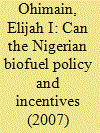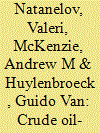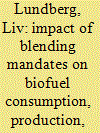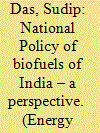|
|
|
Sort Order |
|
|
|
Items / Page
|
|
|
|
|
|
|
| Srl | Item |
| 1 |
ID:
118850


|
|
|
|
|
| Publication |
2013.
|
| Summary/Abstract |
Nigeria's economy is largely dependent on petroleum, yet the country is suffering from fuel supply shortages. In response to the transportation fuel supply difficulties in Nigeria, the country released the Nigerian Biofuel Policy and Incentives in 2007 to create favorable investment climate for the entrance of Nigeria into the biofuel sector. The paper assessed the progress made thus far by Nigeria, 4 years after the Nigerian biofuel was released in an attempt to answer the question whether the policy is adequate to transform Nigeria into a biofuel economy. The study found that little progress has been made, which includes commencement of the construction of 20 bioethanol factories, installation of biofuel handling facilities at two depots (Mosimi and Atlas Cove), and selection of retail outlets for biofuel/conventional fuel mix. The site construction of the announced biofuel projects is now slow and other progress is marginal. We therefore conclude that the Nigerian biofuel policy is unlikely to transform Nigeria into a biofuel economy unless the Government revert and refocus on biofuel and include additional financial incentives such as grants and subsidy to complement the tax waivers (income, import duty, VAT), loans, and insurance cover contained in the policy.
|
|
|
|
|
|
|
|
|
|
|
|
|
|
|
|
| 2 |
ID:
126528


|
|
|
|
|
| Publication |
2013.
|
| Summary/Abstract |
This paper offers a holistic study on the complex relationships between crude oil, corn and ethanol during a turbulent period between 2006 and end of 2011. Through a holistic mapping of the current market situation and a contextual analytical design we show that there exists a strong relationship between crude oil and corn markets on one side, and crude oil and ethanol on the other. However, the price relationship between corn and ethanol was revealed to be less straightforward, and is driven by the US government fuel policy. Furthermore the study indicates that corn markets have became more prone to volatility due to ethanol production, especially when the demand for corn is high and/or the crude oil prices are high enough to create a competitive market for ethanol.
|
|
|
|
|
|
|
|
|
|
|
|
|
|
|
|
| 3 |
ID:
109598


|
|
|
|
|
| Publication |
2011.
|
| Summary/Abstract |
In 2008, the UK launched the first regulatory sustainability reporting scheme for biofuels. The development of the scheme, managed by the Low Carbon Vehicle Partnership for the Department for Transport, involved extensive stakeholder engagement. The scheme has significantly increased understanding by policy-makers, the biofuels industry and its supply chains on how to monitor and manage the sustainability risks of biofuels and increase their greenhouse-gas benefits. It is providing a practical model for similar developments globally. To receive certificates in order to meet volume obligations under the Renewable Transport Fuel Obligation (RTFO), suppliers must provide a monthly carbon and sustainability report on individual batches of renewable fuels they supply into the UK. The Renewable Fuels Agency produces aggregate monthly reports of overall performance and quarterly updates of individual supplier performance. This scheme is an important first step to assist the biofuels industry to demonstrate its environmental credentials and justify the subsidies received. The paper provides a case study of the development of the scheme, its initial outcomes and outstanding challenges.
|
|
|
|
|
|
|
|
|
|
|
|
|
|
|
|
| 4 |
ID:
099338


|
|
|
|
|
| Publication |
2010.
|
| Summary/Abstract |
Despite being a major petroleum producing and exporting country, Nigeria has for a long time imported refined petroleum products for domestic consumption. The country has recently made an entrance into the bio-energy sector by seeding the market with imported ethanol until enough capability exists for the domestic production of ethanol. The Nigerian Biofuel Policy was released in 2007 calling for the domestic production of bio-ethanol to meet the national demand of 5.14 billion litres/year. Some investors have responded by investing over $3.86 billion for the construction of 19 ethanol bio-refineries, 10,000 units of mini-refineries and feedstock plantations for the production of over 2.66 billion litres of fuel grade ethanol per annum. Also, another 14 new projects are in the offing. Of the 20 pioneer projects, 4 are at the conception phase, 8 are in the planning phase, and 7 are under construction with only 1 operational. The potential benefits of the emerging bio-ethanol projects include investment in the economy, employment, energy security and boost rural infrastructure, while the major challenge is land take (859,561 ha). This is the first time an attempt is been made to document the emerging bio-ethanol projects in Nigeria.
|
|
|
|
|
|
|
|
|
|
|
|
|
|
|
|
| 5 |
ID:
192774


|
|
|
|
|
| Summary/Abstract |
The transport sector accounts for about 20% of EU's GHG-emissions. Progress in emission reductions has been slow and primarily driven by biofuels promoted through national blending mandates. The mandates differ in whether they are measured in volume, energy, or emission reduction and in how gasoline and diesel are targeted. Due to this, national mandates and their effects have not previously been quantitatively compared on an EU level. In this article we convert the mandates for all EU member states between 2009 and 2020 to a common unit and study their impact on biofuel consumption, production, emission reductions and fuel prices. We find that mandates are driving biofuel consumption in the EU and correlates with emission reductions. Increased mandates have however often been fulfilled by blending biofuels eligible for double counting. We also find that reduction mandates have been effective in encouraging high-performance biofuels. For historical fuel prices, we do not see a clear correlation between countries' shares of biofuel and consumer fuel prices while the global oil price has a considerable impact. For biofuel production, increased demand drive investments in the EU, but when it comes to localisation of new plants factors such as local infrastructure are more important than national mandates.
|
|
|
|
|
|
|
|
|
|
|
|
|
|
|
|
| 6 |
ID:
177491


|
|
|
|
|
| Summary/Abstract |
The National Policy on Biofuels (NPB) 2018 was adopted on May 16, 2018 in India to augment the generation of biofuels and to build a sustainable biofuel ecosystem. The Biodiesel Blending programme (BBP) got affected due to lack of sufficient feedstock coupled with an 18% Goods and Services Tax (GST) effective from July 1, 2017. The high GST resulted in the price of biodiesel being higher than that of conventional diesel thereby hindering the blending mandates. Most states in India do not allow free interstate movement of molasses resulting in artificially depressed prices besides derailing the Ethanol Blending Petrol (EBP) programme. NPB 2018 prohibits the import and export of biofuels to other nations resulting in reduced economic efficiency. The use of foodgrains as feedstock for biofuel production hampers food availability to the needy people and adversely affects food prices. The higher funding and incentives proposed to 2G ethanol production in NPB 2018 needs to be extended to 1G ethanol also as majority of the ethanol production happens through 1G. The paper touches upon the key biofuel policies of various nations, features of NPB 2018 and its critical analysis, BBP and EBP programmes and their current challenges and suggests future reforms.
|
|
|
|
|
|
|
|
|
|
|
|
|
|
|
|
| 7 |
ID:
121266


|
|
|
|
|
| Publication |
2013.
|
| Summary/Abstract |
The use of biofuels can increase land competition, leading to global land use change (LUC). LUC poses risks such as increased greenhouse gas emissions and food prices. The magnitude of the risk is uncertain, but could be significant. Given these uncertainties and risks, we suggest that policymakers pursue a mix of the following three strategies: (1) promote feedstocks that rely less on land; (2) reduce LUC risk for land-using feedstocks; and (3) stimulate investments that increase land productivity and environmental protection. To realize these three strategies, we recommend that policymakers distinguish among feedstocks based on LUC risk; explore certifying production that avoids land competition; and adopt policy mechanisms that encourage investments in LUC-prone areas. We favor including feedstock-specific LUC emissions estimates in policies despite relatively large scientific uncertainty. While misleadingly precise, point estimates can be selected from science-based ranges to directly link LUC policy to emissions and provide strong transparent signals to biofuel investors. LUC emissions estimates can be updated regularly (~3-5 years) to reflect improvements in scientific understanding, and global changes in policy and economic environments. With or without LUC emissions point estimates, additional policies, some outside the biofuel sector, will be needed to pursue the three strategies above.
|
|
|
|
|
|
|
|
|
|
|
|
|
|
|
|
| 8 |
ID:
111409


|
|
|
|
|
| Publication |
2012.
|
| Summary/Abstract |
Biofuels have undergone a controversial resurgence in the UK since the turn of the century. The aim of this article is to consider this development in the context of ongoing interactions between the controversy and regulatory and engineering activities. It is found that the discursive space of the controversy has increasingly narrowed around environmental issues, particularly greenhouse gas emissions. The implications for biofuel development are considered in the context of changing regulatory and engineering visions in response to indirect land-use change. Opposition to the third generation biofuels may be softened, but it may be more difficult to justify the cost of holistic regulation of land-use change.
|
|
|
|
|
|
|
|
|
|
|
|
|
|
|
|
| 9 |
ID:
136241


|
|
|
|
|
| Summary/Abstract |
A comprehensive review of the U.S. federal biofuel-related policies, from 1955 to 2012, was conducted to examine the progression of life cycle thinking within the policies. Over 1300 past and present federal and state biofuel laws and incentives were analyzed to identify the establishment of Life-cycle thinking (LCT) in the biofuel policies. The policies were searched for search terms representing the three themes: life cycle assessment, environmental impact and sustainability. LCT in policies was first seen in the Renewable Fuel Standard under the Energy Independence and Security Act of 2007, where life-cycle greenhouse gas emissions reduction of biofuels was required. Existing U.S. biofuel policies were also characterized to define types of policy as tax incentive, grants, mandate, etc. The results suggested that climate change or energy incentives, air quality or emissions, etc. should be more emphasized in fuel legislation for a continuous improvement of biofuels industry. Only 13% of both the federal and state policies reviewed in this study employed some aspect of LCT. Policies that incorporate LCT often only focused on greenhouse gas emissions; policies should include other environmental impacts to avoid any environmental tradeoffs and unintended consequences from biofuel production.
|
|
|
|
|
|
|
|
|
|
|
|
|
|
|
|
| 10 |
ID:
125742


|
|
|
|
|
| Publication |
2013.
|
| Summary/Abstract |
Today, biofuels represent one of the most common options for larger scale substitution of conventional fuels. Due to the trans-sectoral nature of biofuels, a multitude of factors and actors determine the according policies of governments and the beliefs of societies. Especially since some impacts of biomass cultivation for bioenergy production are not yet fully understood. This article aims at showing the drivers that led to an introduction of biofuel policies in Germany and explains Germany's pioneering role in the promotion of bioenergy. Thereby the focus lies on the role of the main actors and their composition of so called discourse coalitions. The analysis indicates that the origin of the biofuel industry was a result of national and supranational market interventions, as well as it was intermittently an instrument of supporting renewable energies. Along the seesaw of Germany's biofuel policies seven discourse coalitions were identified who compete for discursive hegemony in order to gain political influence.
|
|
|
|
|
|
|
|
|
|
|
|
|
|
|
|
|
|
|
|
|